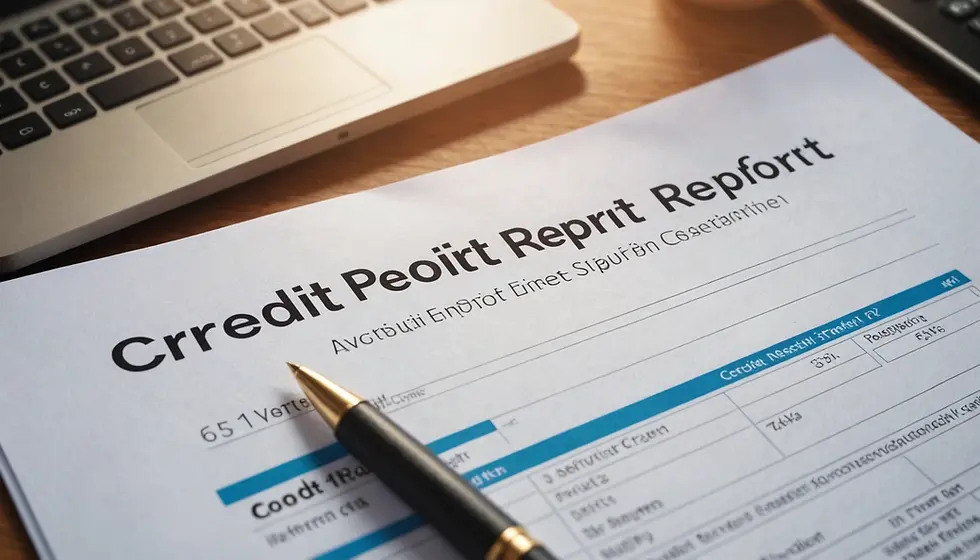Credit Scores: What's the Deal with Hard and Soft Pulls?
- Mini Mike

- Jan 1
- 3 min read
Understanding credit scores can often feel overwhelming, especially with the jargon surrounding credit inquiries. If you've applied for a loan or credit card, you've likely encountered the terms "hard pull" and "soft pull." But how do these inquiries influence your credit score? Let’s explore the differences between these two types of inquiries, their impact on your score, and why it matters to your financial health.
What Are Hard Pulls?
Hard pulls, also known as hard inquiries, occur when a lender checks your credit report as part of their decision-making process. This typically happens when you apply for new credit, such as a mortgage, car loan, or credit card. For example, applying for a mortgage can involve several hard inquiries, potentially lowering your score by 5 to 10 points.

In contrast, soft pulls happen without your explicit action and do not affect your credit score. These can occur when you check your own credit or when lenders perform pre-approval assessments.
How Hard Pulls Impact Your Credit Score
Now, let’s break down how hard pulls affect your credit score. Each hard inquiry can cause a temporary drop, typically around 5 points. Fortunately, this decline tends to be minor and short-lived. Hard inquiries stay on your credit report for about two years, but their influence weakens over time.
However, if you have multiple hard inquiries within a few months, lenders may view this as a sign of financial distress. For instance, if you apply for four credit cards in one month, potential lenders might hesitate before approving your applications, thinking you are taking on more debt than you can handle.
Understanding Soft Pulls
Soft pulls remain benign compared to hard pulls. They have no effect on your credit score, which is reassuring for individuals who regularly check their credit.
Think of soft pulls as routine checks that occur without a formal application. They can include scenarios like:
Checking your own credit score, which 60% of Americans do at least once a year.
Employers conducting background checks, with about 34% of employers using credit reports as part of their hiring process.
Insurance companies reviewing your credit for premium quote evaluations, which can influence about 16% of your insurance rates.

In essence, while hard pulls can lower your score, soft pulls provide a safe way to keep an eye on your credit activity without negative repercussions.
When You Should Be Concerned About Hard Pulls
While having some hard inquiries is normal, too many can raise red flags for lenders. If you submit applications for several lines of credit in a short time—such as three different credit cards in a month—it could look risky.
According to credit experts, lenders prefer applicants with a stable credit history and minimal hard inquiries. If you're gearing up for a significant purchase like a house—which nearly 33% of adults plan to do—it’s wise to space out your credit applications. A good rule of thumb is to wait at least six months between applications.
The Benefits of Monitoring Your Credit
Keeping a close watch on your credit report is vital for maintaining a healthy credit score. Regular monitoring allows you to spot inaccuracies or unauthorized inquiries swiftly.
There are many free resources available that enable you to check your credit score without a hard pull. For example, popular services like Credit Karma and AnnualCreditReport.com allow you to view your credit score at no charge, promoting an informed approach to managing your finances.

How to Minimize Hard Pulls
If maintaining a strong credit score is your goal, here are some straightforward tips to reduce hard pulls:
Space Out Applications: Only apply for loans or credit when necessary, and try to spread out your applications over several months. This approach helps maintain your score.
Research Before Applying: When considering a certain credit product, check if the lender allows for a soft inquiry first. This lets you assess eligibility without impacting your credit score.
Focusing on these strategies will help shield your credit score from unnecessary dips.
Finding the Right Balance
Understanding the difference between hard and soft pulls is crucial in today’s credit-driven world. While hard pulls can temporarily lower your score, they are often essential for obtaining loans and credit. On the other hand, soft pulls are harmless and help you track your credit health.
Striking a balance in your credit inquiries is the best strategy. By regularly checking your credit report and applying for credit wisely, you can maintain a strong credit score while keeping your financial options open.
Being well-informed about hard and soft pulls is a significant step in taking charge of your credit. By practicing caution and staying aware, you can make informed financial decisions that align with your goals.









Comments